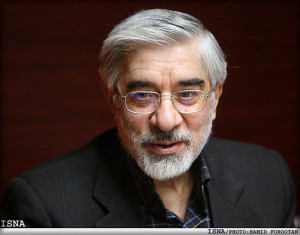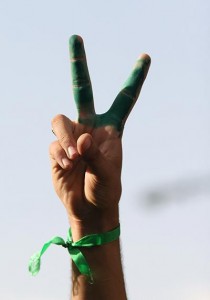Friday
Feb262010
Iran: Mousavi, The Regime, & "The Prerequisites of Escalation"
 Friday, February 26, 2010 at 10:48
Friday, February 26, 2010 at 10:48  From The Newest Deal:
From The Newest Deal:In his 17th statement, Mir-Hossein Mousavi made five specific points that he deemed necessary to start the political (and national) reconciliation process. The proposal lead to a noticeable uptick in the weeks leading up to 22 Bahman in talk of the need for national "unity" and also garnered much attention from Iranian intellectuals and dissidents. Ultimately, the regime's more radical elements reemerged and silenced the chatter before the security apparatus prevented a strong opposition showing on the revolution's 31st anniversary. But Mousavi's "five points," as they have come to be called, still carry much weight. Generally, they are:
- Government accountability for post-election violations
- Legislation of new election laws that would safeguard reform-minded candidates from regime's current vetting process
- Release of all political prisoners
- Freedom of the press and political-neutrality on state-run IRIB television
- Freedom to assemble, as guaranteed by the Islamic Republic's constitution
Were these five conditions to be met, the Green movement would arguably have the breathing space it needs to mobilize and begin the long process of transforming Iranian society. For if anything became apparent in the weeks leading up to and after the June election, it was that Iran has undergone an awakening. It has simply been the repression that the above five grievances capture that has prevented the social movement's aspirations from coming to fruition.
Therefore, perhaps an alternative frame can be adopted to view Mousavi's five points. As a recent Tehran Bureau profile wonderfully captured, the reluctant leader of Iran's opposition has matured into a rather shrewd, cautious, and patient figure. While circumstances prevent him from voicing such a sentiment in public, the leader of the Green movement likely recognizes that the regime has reached a point of no return. The tyranny, the executions, the outright fascism -- all of it is, to quote his Mousavi from an interview on the eve of 22 Bahman, an outgrowth of the "revolution's failures" and the "roots of tyranny and dictatorship" that persist in society from the reign of the Shah. These are damning (and yet still very measured) words from one of the Islamic Republic's own founding fathers.
Thus, seeing the regime in this light gives Mousavi's five points new significance. The demands would no longer be five steps the regime must take in order to rescue the country from its current crisis, but rather, five blatant and particularly egregious shortcomings that the regime will inevitably be unwilling to address, and that will thus escalate the conflict between the Greens and the regime. For in the wake of the June coup d'etat, if one thing has become clear it is that those currently in control will never meet any such conditions, even if moderate voices within their camp plead otherwise. Political calculus has been replaced by megalomania, with the possibility of reconciliation falling victim.
And so if these five points are instead five tests that the regime must fail before confrontation with the regime escalates to the next phase, the news emerging this week from the Expediency Council and Assembly of Experts -- both bodies chaired by Akbar Hashemi Rafsanjani -- is indeed very telling. First, the Council began considering aproposal being pushed by Rafsanjani and Mohsen Rezaei that would take away the Guardian Council's vetting role and instead give it to a new "National Election Committee" of sorts, which would conveniently be under Rafsanjani's supervision in the Expediency Council. (Ironically, the proposal to revise the country's election laws was made to Supreme Leader two years ago, after which he ordered for a new plan to be drawn up).
Make no mistake: this would essentially be a first step in meeting the second condition laid of Mousavi's 17th statement. Were the change to the vetting process be enacted, the Guardian Council would no longer be able to disqualify candidates from running for president or parliament, as it did when it disqualified all but four candidates from running in the 2009 presidential election.
The chances of the plan coming to fruition, however, appear slim. With the regime still reeling from the aftermath of the June elections and still off-balance going forward, it would have no reason to suddenly invite more political opposition in Majlis through freer elections in 2012. Hossein Shariatmadari, editor of the ultra-conservative Kayhandaily and someone who is regarded as being close to Khamenei, has already come out on the attack, stating that any propsoal to create such an electoral commission would be "against the Islamic Republic's constitution."
No sooner than the proposal was being discussed, more divisive conservative rhetoric emerged from the other body Rafsanjani chairs, the Assembly of Experts. In a statement reported by Fars News, the Assembly allegedly declared that the regime's patience with the opposition "ended in December after sedition leaders missed numerous chances to repent and return into the gown of the revolution." (Enduring America notes, however, that the statement is missing on the Assembly of Experts' official website and that several prominent members were absent from the Assembly's two-day meeting). Khamenei, for his part, has reiterated the statement's pronouncement in his own statement, saying that those who still do not accept the June presidential election result "would be disqualified from participating in the Islamic system."
The obstacles in revising the regime's election laws aside, the other four points from Mousavi's 17th statement have gone unheeded as well. Saeed Mortazavi, though implicated by Majlis [Iran's Parliament] in the Kahrizak torture-murders, remains a free man. Rather than having political prisoners freed, the country recently saw the greatest wave of arrests sweep dissidents since late June and early July. Meanwhile, state-controlled media remains entirely propagandized while any questions regarding citizens' right to freely assemble were surly answered by the enormous security presence deployed on 22 Bahman.
Not even appearing to consider the proposals, the regime seems bent on acting counter to each of Mousavi's five points. Despite the intentions of some del-soozan, (or "heartbroken" moderate conservatives), any promise for political reconciliation also appears dead. Rather, the crisis seems destined to continue indefinitely, and with neither side refusing to back down, Mousavi's five grievances may come to be prerequisites for the regime to unconditionally reject before the opposition begins to decide on how to take the uprising to the next level.

